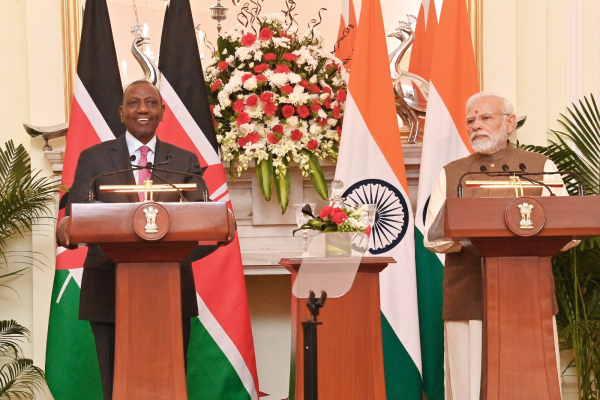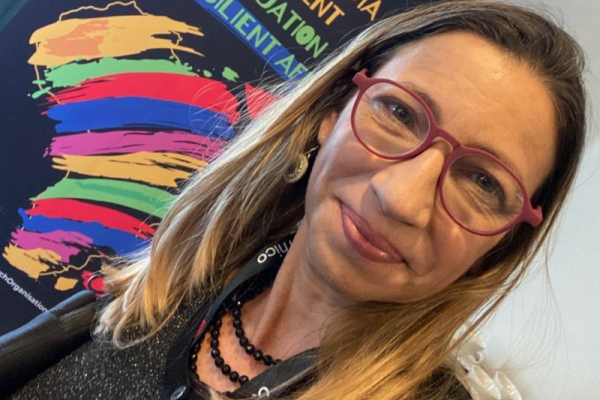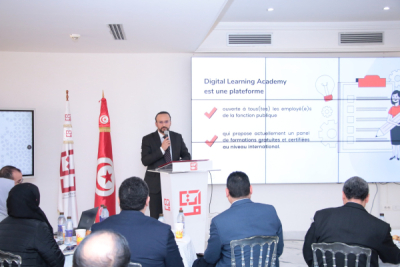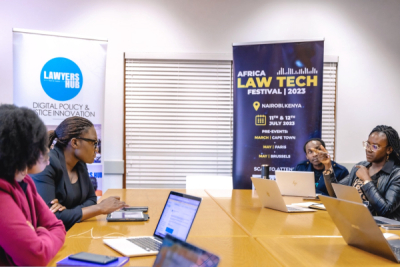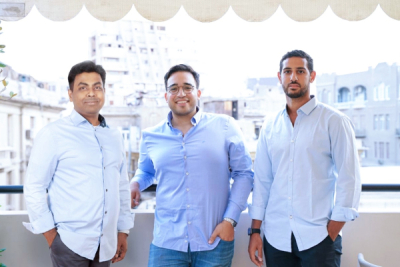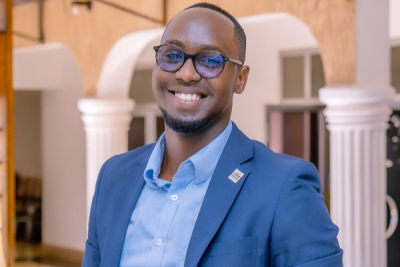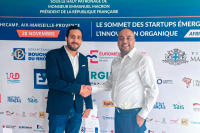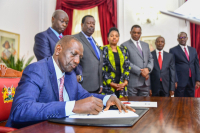India and the Republic of Kenya have maintained robust bilateral ties spanning various sectors since 1948. Recently, the two countries decided to step up their cooperation in the digital field.
Kenyan President William Ruto embarked on a three-day visit to India on Monday, December 4. The visit culminated in the signing of five memorandums of understanding (MoUs) spanning critical sectors, including technology, public digital infrastructure, defense, agriculture, energy, and healthcare.
Underscoring the importance of this strategic partnership, President Ruto remarked, "Kenya and India will expand partnership in technology along other sectors. We will benefit tremendously from India’s capacity and experience as a global leader in technology."
The digital agreement paves the way for India to facilitate the transfer of skills and technologies tailored to Kenya's specific needs, particularly in the areas of health, education, ICT, and digital governance. Additionally, the two countries' Heads of state explored avenues for Kenya to harness the potential of e-health by leveraging digitization and technology in telemedicine and telehealth initiatives.
India's burgeoning ICT sector has garnered global attention in recent years, prompting partnerships with numerous nations seeking to emulate its success. In Africa, aside from Kenya, countries like Sierra Leone, Nigeria, Egypt, Gabon, the Democratic Republic of Congo, and Mauritius have established partnerships with India to advance sectors such as artificial intelligence, telecommunications, and digital infrastructure.
The initiative aligns with President William Ruto's vision of harnessing digital technology to drive socio-economic development in Kenya. The country aspires to become a benchmark for digital transformation in Africa by 2027. This ambitious goal entails developing a cutting-edge digital infrastructure, expanding high-speed internet access nationwide, digitizing education and select government services, and enhancing the population's digital skills.
Samira Njoya
Before entering a new market, companies and brands typically undergo a crucial phase of market research. In Angola, Filipa Oliveira offers her expertise in market research and economic intelligence to assist these companies.
Filipa Oliveira (photo) is an Angolan entrepreneur holding a degree in Economics from the University of Coimbra (1992) and a Master's in Strategic Marketing Management from the University of Sao Paulo (2015). She is also one of the co-founders and the CEO of Market Intelligence Research Angola (MIRA).
Established in 2016, MIRA comprises a dedicated team of experts proficient in market research, data analysis, and business intelligence. Leveraging their extensive experience in the Angolan market, the company excels in collecting, processing, and developing reliable information systems. This valuable resource is then made accessible to both private and state institutions, aligning with MIRA's mission to transform information into actionable ideas that empower clients to gain a competitive edge in their respective markets.
Beyond her role at MIRA, Filipa Oliveira is actively engaged in fostering entrepreneurship in Africa. Since 2019, she has served as a mentor at Founder Institute in Luanda, a business accelerator facilitating the transformation of entrepreneurial ideas into fundable startups and, subsequently, into global businesses.
Since 2010, she has been a board member of the Pan African Media Research Organisation (PAMRO), a collaborative platform that contributes to the creation of a comprehensive continental media research database.
Her professional journey includes a stint at Marktest Angola (2007-2016), a subsidiary of the Portuguese Marktest Group specializing in market research and software development. It was her experience with this company that inspired the creation of MIRA.
Melchior Koba
The COVID-19 pandemic accelerated the adoption of e-learning platforms, and their usage has continued to rise since. Recognizing the effectiveness of this approach, the Tunisian government has embraced e-learning platforms as a key tool for training its civil servants.
Nizar Ben Néji (photo, center), Tunisia's Minister of Communication Technologies, inaugurated the "Digital Learning Academy" platform on Friday, December 1. The primary goal is to provide 680,000 civil servants with access to online training courses to enhance their digital skills.
The initiative, spearheaded by the Ministry of Communication Technologies, is overseen by Smart Tunisian Technoparks, a Tunisian technopark specializing in information and communication technologies.
The launch of the Digital Learning Academy aligns with Tunisia's comprehensive digital strategy, set to be fully implemented by 2025. This strategy prioritizes the digitization and simplification of administrative procedures alongside the development of enhanced digital services for citizens. To effectively implement these objectives, government employees must adapt to evolving digital standards and embrace new technologies. The Digital Learning Academy addresses this need by providing civil servants with access to a comprehensive range of free, internationally certified online training courses, fostering a more digitally skilled and adaptable workforce.
Adoni Conrad Quenum
Lawyers Hub is one of the most important players in the African legal technology landscape. Through its thought leadership and innovative programs, it is shaping the future of law and technology on the continent.
Founded in 2017 by digital law expert Linda Bonyo, Lawyers Hub is a pan-African organization that champions legal and technological innovation across the continent. Headquartered in Nairobi, Kenya, the organization provides digital policy guidance, leverages technology to empower startups, and fosters a thriving legal technology ecosystem.
Steered by a team of committed and experienced professionals, it has set up several programs and activities to support its objective. One of these, the Africa Digital Policy Institute, offers in-person and virtual training sessions targeting different industries on artificial intelligence, cybersecurity and data protection, and compliance courses for legal professionals and practitioners. It also manages the Africa Law Tech Association and the Africa Startup Law Accelerator.
Lawyers Hub organizes flagship events that bring together key stakeholders within Africa's legal and technology sectors. For instance, The Africa Law Tech Festival, an annual gathering attracting over 2,000 participants from more than 40 countries, serves as a catalyst for dialogue and collaboration on the latest trends and developments in legal technology. Africa Legal Innovation Week, another marquee event, convenes legal technologists from across Africa to delve into the transformative potential of technology in shaping the future of justice and the legal sector. The 2023 edition of that innovation week took place from November 27 to December 1st.
Through these initiatives, Lawyers Hub empowers African lawyers in technology law and equips ecosystem players and governments with the knowledge they need to navigate the policies governing the technology industry. The organization further recognizes outstanding achievements and groundbreaking advances in the world of law and technology through the Africa Legal Innovation Awards. These awards honor individuals working in the legaltech space in Africa, including lawyers, policymakers, and innovators.
The organization collaborates with several international companies and organizations. Among others, these include Mozilla, Witness, Edgelands Institute, UNESCO, and the University of Cambridge.
Melchior Koba
Egyptian proptech startup Partment has expanded into Greece, Disrupt Africa announced yesterday.
"This expansion aligns with our global vision of enhancing people’s well-being through sustainable second home access, making real estate investments affordable and accessible to all," said Nadim Nagui, Partment co-founder and CEO.
After several years working for non-profit organizations, the entrepreneur decided to promote local tourism. He developed several solutions –including LearnSwahili App that promotes Swahili and mobile games –to achieve his goal.
Elias Patrick (photo) is a young Tanzanian entrepreneur with an International Diploma in Business Information Technology (IDBIT) obtained in 2016 from NCC Education in England. He is the founder and a tutor for edtech platform LearnSwahili App Ltd.
Founded in January 2023, LearnSwahili App Ltd's mission is to provide an immersive and enriching platform where individuals can learn Swahili, connect to its cultural heritage, and gain new opportunities for personal and professional development. Apart from teaching Swahili and promoting its culture, the startup also promotes local tourism.
In July 2022, the entrepreneur unveiled three mobile games he and six other technicians have been working on to promote local tourism. The games available in 177 countries are named Kilimanjaro Block Puzzle, Serengeti Block Puzzle, and Tanzanite Crush, after Tanzania's main tourist attractions.
Apart from his duties with LearnSwahili App Ltd, Elias Patrick is also the Managing Director of TechForward Tanzania, a non-profit organization that harnesses the transformative power of technology to drive positive change. He is also the knowledge management specialist for Nacopha, an organization created by people living with HIV/AIDS (PLWHA) to serve as the apex body and ultimate voice for their concerns in Tanzania.
Before entrepreneurship, Elias honed his digital marketing skills at UBA Tanzania (2018-2020) and McDaan Ltd. (2020). He then joined Save the Children International (2021-2022) as the communications and knowledge specialist. In 2016, the Tanzanian was voted Entrepreneur of the Year by the Learnit Institute of Business and Technology and the UK's NCC Education.
Melchior Koba
Digital transformation is rapidly gaining momentum across Africa, and The Gambia is actively embracing this shift, implementing initiatives to harness the transformative power of technology and reap the benefits of the digital economy
After nine months of collaboration with the United Nations Economic Commission for Africa (UNECA), The Gambia is preparing to launch a comprehensive "twin-pronged" digital strategy: one for transformation, the other for identification. This plan aims to propel the country into a new era of innovation, fostering economic growth, social inclusion, and government efficiency, as the UNECA says in a statement.
The strategy will be validated at a workshop to be held in the Gambia from Wednesday, December 19 to Thursday, December 20. Among other things, its digital transformation component envisions robust e-government services, streamlined administrative processes, and seamless interactions between citizens and the state. It also calls for the development of high-quality digital infrastructures and the empowerment of citizens in digital skills.
Meanwhile, the digital identification component calls for a standardized, interoperable system, seamlessly connecting citizens to a vast array of government and private sector services. It also defines the means that will be deployed to protect citizens' privacy, in line with best practices and international standards in digital identity management.
The comprehensive strategy is designed to tackle the digital divide, ensuring equitable access for all. According to studies carried out in the country, digital identification could contribute between 1% and 3% to real GDP in the years following its implementation.
Samira Njoya
Team collaboration startup Cynoia announced last week the successful completion of a €850,000 financing round. The funds will finance the company's expansion in West Africa, mainly in Côte d'Ivoire and Senegal.
Digital transformation is positively impacting key sectors of the economy, notably in Africa with sectors like agriculture and finance. To further capitalize on its opportunities, African countries are actively invested in initiatives such as innovation support schemes that aim to encourage innovation and entrepreneurship.
Last week, the Tanzanian and Moroccan governments launched a satellite-based system for the digital collection of agricultural harvest data. The launch took place at the Tanzanian Agricultural Research Institute's (TARI) Uyole center in Mbeya, Tanzania.
The new system, which costs more than a billion Tanzanian shillings (around $399,202), should enable better estimates of agricultural yields and cultivated areas.
The system works by using smartphones equipped with satellite connectivity to collect data from "white zones," which are areas with limited or no internet access. These zones are home to most of Tanzania's agricultural regions.
The data collected by the smartphones will be used to monitor crops from germination to harvest. This will allow the Tanzanian government to have more accurate statistics on agricultural production.
"The aim is to have actual statistics of what we produce in every farming season," explained Fredrick Mlowe, a soil expert at the TARI center in Uyole. "Our officers used to predict the amount of crops to be harvested, a practice that is now phasing out as we are switching to digitalization,” headded
Tanzania is hoping that the new system will help to make agriculture a key sector for its economic development. In the age of the technological revolution, digitization is seen as a mandatory step for improving agricultural statistics. This, in turn, will enable the government to have a clearer vision of food security, monitor crop prices, identify production basins, provide financial support to farmers, and anticipate food shortages.
Adoni Conrad Quenum
Despite the continent's booming startup scene, only a handful of countries –Tunisia, Congo, and Nigeria– have legal frameworks specifically designed to support and nurture local startups. Kenya, with its vibrant tech hub, aims to join this exclusive club in 2024 by enacting its own Startup Act.
Kenya's Startup Bill, which has been in the Senate since 2021, will be enacted in 2024, President William Ruto (Photo, left) announced at the Kenya Innovation Week (KIW) last week. This landmark legislation promises to be a game-changer for Kenyan innovators, offering them not only a supportive legal framework but also tangible benefits and a dedicated platform to access various resources.
“By March, or April next year, we will have a firm startup law in Kenya, which will assist many of our innovators to de-risk their innovations and turn them into businesses," said President Ruto.
Despite lacking such a framework, Kenya's tech ecosystem has consistently attracted most of the investments in Africa in recent years, along with Nigeria, South Africa, and Egypt. According to Disrupt Africa’s "The African Tech Startups Funding Report 2022”, Kenyan startups captured $574.8 million in investments in 2022, $292 million in 2021, and $191.4 million in 2020. This bill is expected to further enhance Kenya's attractiveness, create jobs and wealth, and connect research institutes with businesses.
Adoni Conrad Quenum
More...
As the digital revolution sweeps across every field, new technologies are emerging to revolutionize the way people work. In the agriculture sector, one of the promising technologies is artificial intelligence, which is poised to greatly transform the sector by for instance helping optimize resource usage and minimize waste.
On Friday, December 1st, British pharmaceutical giant AstraZeneca announced a reforestation initiative in Kenya. Unveiled during COP28 in Dubai, the project aims to plant six million trees and leverage the power of artificial intelligence to monitor their growth and health.
Kenya's Rift Valley will be the heart of this initiative, spanning six counties and encompassing over 3,500 hectares of land. Experts will utilize a deep learning AI model to analyze drone and satellite imagery, tracking each tree's progress and quantifying carbon sequestration levels.
"Investing in our natural world through tree planting and conservation, and limiting deforestation, are some of the most effective preventative health steps we can take. By expanding AZ Forest to Kenya, we are progressing our commitment to deliver reforestation at scale, with a science-led approach that benefits both the environment and local communities," said Juliette White, AstraZeneca Vice President of Global Sustainability.
This initiative forms part of AstraZeneca's global "AZ Forest" program, launched in 2020 to plant and nurture 200 million trees –in partnership with landscape restoration specialists– across six continents by 2030.
Beyond Kenya, "AZ Forest" has planted nearly 3 million trees in Ghana this year alone, bringing their total to over 4 million since 2021. Rwanda is next in line, with a target of 5.8 million trees on 21,000 hectares in the coming months.
Samira Njoya
Despite ongoing endeavors to expand international connectivity and the deployment of fiber optic backbones across West Africa, significant hurdles remain. The steadfast support of the World Bank is poised to further accelerate progress in this critical domain.
The World Bank has approved $266.5 million in financing for the Digital Transformation for Africa (DTfA)/West Africa Regional Digital Integration Program (WARDIP). This transformative initiative aims to revolutionize the digital landscape of Gambia, Guinea, Guinea-Bissau, and Mauritania, laying the foundation for a connected, innovative, and inclusive future.
"DTfA/ WARDIP is a crucial step toward an interconnected, innovative, and inclusive future for West Africa. Beyond shaping a digital landscape, it aims to foster regional integration through collaboration and strategic investments,” commented Boutheina Guermazi, World Bank Director for Regional Integration for Africa and the Middle East.
This timely intervention comes amidst West Africa's burgeoning efforts to digitize the region. While mobile broadband coverage has expanded, substantial gaps in digital connectivity, access, and usage persist. According to World Bank data, mobile broadband adoption rates remain below 40%, primarily due to prohibitively high retail prices.
The World Bank's support will empower ICT companies and service providers to capitalize on opportunities to foster a growth-conducive regional digital market. Public sector entities, universities, and regulatory bodies will also receive targeted support to enhance their contributions to digital development. The project will further bolster the efforts of the Smart Africa alliance, building the capacity of African decision-makers and policymakers in digital transformation.
Ultimately, the program will lower the digital divide by reducing the cost of Internet services in the region, stimulating competition among service providers, and upgrading underlying infrastructure. This transformation is expected to generate new employment opportunities, expand access to services for 1.3 million inhabitants, and reduce gender inequalities in digital skills, entrepreneurship, and financial services. The goal is to ensure that women have equal opportunities to benefit from the digital economy, with a target of reaching 50% of women and people with disabilities.
Samira Njoya
Thanks to the support and guidance provided by 2iE Incubator, numerous projects have been launched and contributed to the economic development of Burkina Faso. Far from resting on its laurels, the incubator continues to promote innovation and entrepreneurship in Africa.
2iE Incubator is a technological and social incubator that plays a pivotal role in empowering and supporting innovative entrepreneurs across diverse sectors, including agro-industry, eco-construction, water, sanitation, and renewable energies. Established in 2012 by the International Institute for Water and Environmental Engineering (2iE) in Burkina Faso, 2iE Incubator is dedicated to fostering the development of locally-driven solutions with a profound social and environmental impact.
The incubator provides project leaders and innovative companies with tailored support, access to cutting-edge technical and scientific infrastructure, financial backing, and a comprehensive network of mentors, experts, and investors. It additionally organizes a range of training courses, workshops, competitions, and networking events to foster collaboration and knowledge-sharing among its constituents.
Located within the scientific complex of the Ouagadougou campus, it boasts 257 square meters of dedicated space, encompassing two coworking rooms, two meeting rooms, three individual offices, a testing and prototyping platform, a reprography room, a kitchen, a coffee/relaxation and idea exchange area, and ample archiving and storage facilities. These coworking spaces are accessible to entrepreneurs and professionals, whether or not they are formally part of the 2iE Incubator program.
2iE Incubator also serves as an accelerator and incubator for established companies seeking rapid expansion or planning to establish their operations at 2iE sites. The incubator aims to facilitate their transition to scale by providing preferential access to financing sources tailored to their specific growth requirements.
Since its inception, 2iE Incubator has nurtured a multitude of successful projects. One notable example is the agri-food social enterprise InnoFaso, which is a member of the incubator. InnoFaso is committed to combating malnutrition by developing preventive and curative solutions, primarily utilizing locally sourced raw materials.
The incubator is supported in its mission by SOGEA SATOM, the Organisation internationale de la francophonie, the Fondation l'Occitane, the Maison de l'entreprise du Burkina Faso and Total, among others.
Melchior Koba
From December 21 to 22, Morocco's economic hub, Casablanca, will host the 3rd edition of the "Digital Now!" conference. Organized by the business network Club des Dirigeants (CDD), this event has established itself as a pivotal gathering for professionals driving Morocco's digital and entrepreneurial landscape. This year's edition will delve into critical topics shaping the digital landscape, including digital transformation, the impact of artificial intelligence on businesses, tackling cybersecurity challenges, and safeguarding data.


